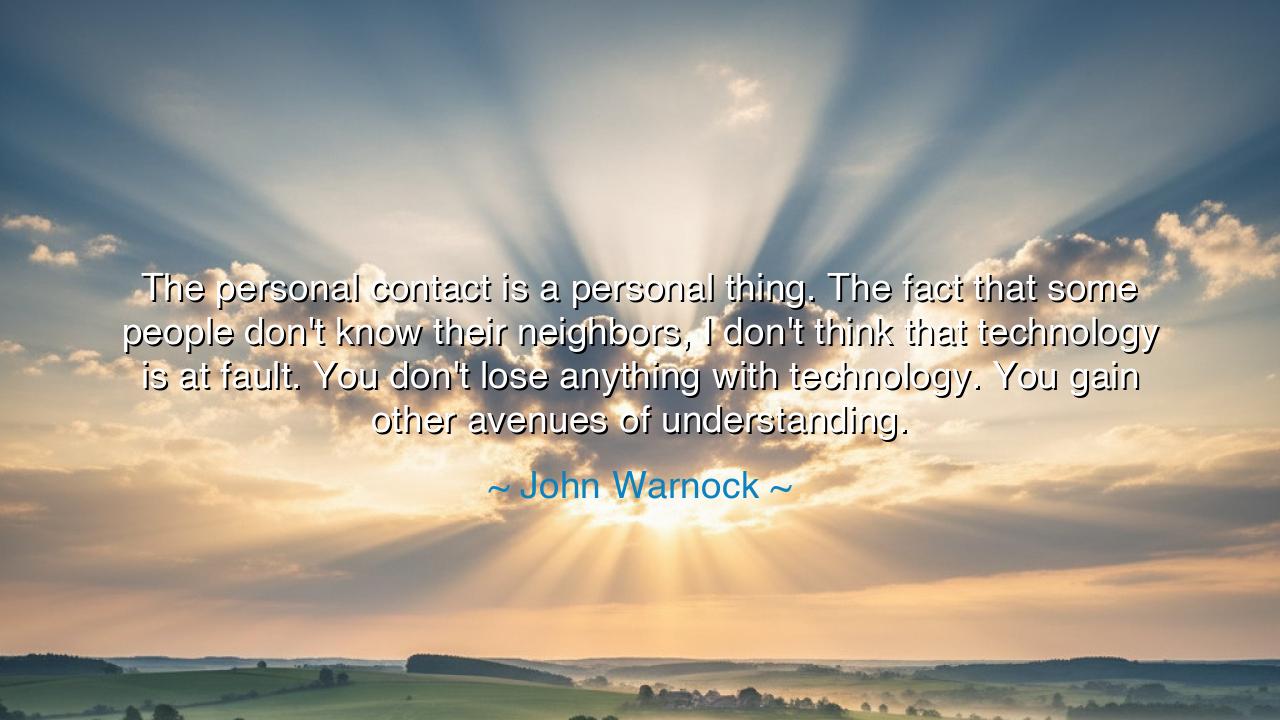
The personal contact is a personal thing. The fact that some
The personal contact is a personal thing. The fact that some people don't know their neighbors, I don't think that technology is at fault. You don't lose anything with technology. You gain other avenues of understanding.






Hear now the words of John Warnock, a craftsman of the digital age and co-founder of Adobe, who spoke not only as an inventor of tools but as a seer of their meaning: “The personal contact is a personal thing. The fact that some people don't know their neighbors, I don't think that technology is at fault. You don't lose anything with technology. You gain other avenues of understanding.” These words are not cast in defense of machines, nor in blame of men, but in the clear-eyed balance of wisdom. For they remind us that the heart of human connection lies not in wires or walls, but in the choice of the soul to reach out, to know, and to be known.
The origin of this saying is rooted in the late twentieth century, when technology was rising like a flood, and many feared it would drown the warmth of human relationships. Warnock, as one who gave the world tools to communicate—fonts, documents, and the sharing of ideas—understood that tools themselves are innocent. They extend the voice, they carry the message, they give shape to thought. But whether these gifts are used for isolation or for communion rests in the heart of the one who wields them. Thus he declared: do not blame technology for loneliness, for the personal contact has always been a choice of will, not of device.
Consider, children of tomorrow, the ancient agora of Athens. There, men met face to face, speaking of laws, poetry, and the fate of nations. Their contact was personal, immediate, and shaping. But when writing spread, when scrolls carried words far beyond the agora, did this lessen the power of personal contact? No—it gave new avenues. A philosopher might still stand in the square, yet his thoughts could also travel to distant lands, stirring minds he never met. Writing did not erase the neighbor; it multiplied neighbors across the earth. So too, Warnock tells us, technology does not erase, but opens other ways of understanding.
Yet let us not be naïve. There are those who blame machines for their loneliness, who say, “I do not know my neighbor because of the screen.” But hear the wisdom: the screen does not lock the door, nor forbid the greeting. It is not the fault of radio, or phone, or internet, that some choose to remain apart. The personal thing is always personal—born of courage, kindness, and attention. Technology may tempt us to easier paths, but it cannot rob us of the greater one unless we freely surrender it.
History gives us examples. During the Second World War, families gathered around the radio, listening together as voices from far away told of battles and victories, of sorrow and hope. Did this destroy personal contact? No—it deepened it, uniting communities in shared experience. At the same time, letters flew across oceans, carrying words from soldiers to loved ones, giving comfort in days of fear. Technology did not rob these bonds; it sustained them when distance might have broken them. Warnock’s words remind us that every new tool can be a vessel of understanding, if the human heart chooses to use it so.
The lesson is plain: blame not the tools, but the choices. If you wish to know your neighbor, knock upon their door, share a meal, speak face to face. If you wish to understand the stranger across the sea, use the gifts of technology to listen, to learn, to share. Do not despise the new avenues, but neither neglect the old paths. The personal will always remain personal, rooted in presence and sincerity.
Therefore, I say to you: be masters of your tools, not servants to them. Use the screen to connect, but do not let it replace the embrace. Use the voice that travels through wires, but do not forget the voice that rises in the warmth of the room. Seek both, and you shall be richer for it. For Warnock’s wisdom is this: with technology you lose nothing, but you may gain everything—if only you keep alive the flame of the personal.






AAdministratorAdministrator
Welcome, honored guests. Please leave a comment, we will respond soon